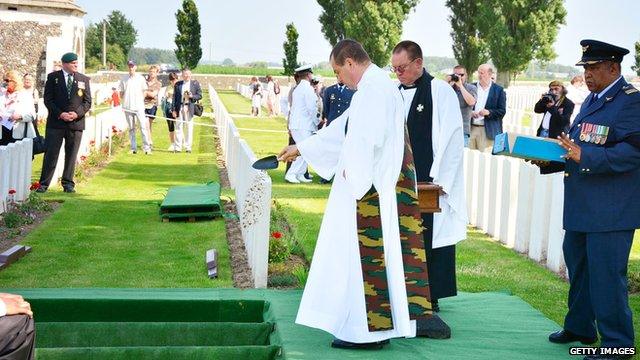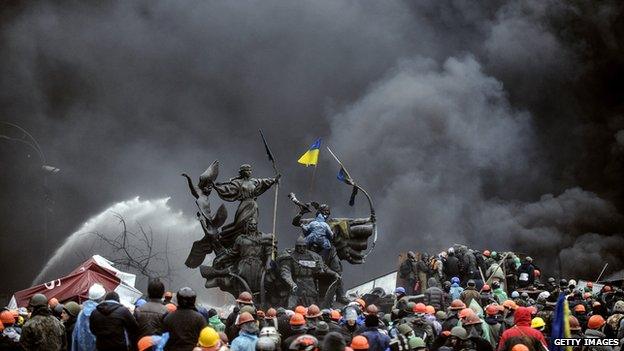What are the chances of a third world war?
- Published
- comments

Three South African soldiers, whose remains were found last year, are buried at Tyne Cot cemetery near Ypres
This year Britain is commemorating the centenary of the start of World War One. But could we ever face a third world war? I decided to find out for The Editors, a programme that sets out to ask challenging questions.
Wandering around the war cemeteries of Flanders and northern France, I was constantly struck by the thought of the hundreds of thousands of private, small-scale catastrophes that are commemorated there.
Tyne Cot, external is the largest of the WW1 British cemeteries. It contains the bodies of 11,000 men.
Row upon row of the beautifully maintained white headstones are engraved with Rudyard Kipling's words, A Soldier of the Great War, Known Unto God.
Blown apart by high explosive or drowned in the mud, huge numbers of men simply vanished or were impossible to identify.
Disastrous day
On the great rear walls at Tyne Cot, near the ancient Belgian city of Ypres, the names of those who died are inscribed in stone.
Yet the tragedy was not limited to these men. Many more were badly damaged, physically and mentally, by what they went through.
My own great uncle was one of them. The names of scores of his fellow soldiers from the East Surrey Regiment are listed at Tyne Cot.
Some were killed on the first disastrous day of the Battle of the Somme. Others died during the four bloody months that followed.
My great-uncle Harold, who was promoted from second lieutenant to captain during the fighting on that first day, 1 July 1916, survived. But he was not unscathed.
He went into the battle a handsome, clever, charming man of 25, with a highly promising future.
He was wounded in the head by a piece of shrapnel, and never recovered. His entire character changed.
He turned into a morose, violent drunk, subject to devastating headaches.
Silver watch
His wife divorced him, and his family, who had once been so proud of him, closed their doors to him when he came round, angrily demanding money from them.
Harold eked out an existence as a homeless beggar for nearly 50 years, and eventually died on a bench at Waterloo station in London. The silver watch he wore when he led his men over the top on 1 July 1916 was still on his wrist.
A century later, could another world war break out?
John Simpson visits Tyne Cot
It seems unlikely - but that, of course, is exactly what people everywhere believed before the assassination of Archduke Franz Ferdinand and his wife by a Serbian extremist in June 1914.
There are certainly potential flashpoints at present. Europe and Russia are trading angry insults over Ukraine, and China and Japan are squaring up over a few uninhabited islands in the East China Sea.
There are two particular dangers at such times.
The first is that smaller countries can drag larger ones into conflict. In 1914, Russia, France and Britain became involved on Serbia's side, while Germany supported Austria.
The second is that governments are sometimes tempted to believe they can launch limited, successful wars that will be over quickly. They are usually wrong.

Ukraine, scene of deadly clashes this month, is a potential flashpoint between Russia and Nato.
We assume nowadays that our globalised world is too closely linked together for a wider war to break out. Well, maybe, but in 1910 a man named Norman Angell thought exactly that.
Runaway best-seller
He wrote a book, The Great Illusion, to prove that war would be madness, given the close trading ties between the great powers.
It was a runaway best-seller but although he was quite right, and received the Nobel Peace Prize 22 years later, war broke out anyway.
Still, things have changed greatly in 100 years. No matter how it may seem, our world is less dangerous and war-prone than it was.
The threat of all-out nuclear war no longer hangs over us.
At present there are more than 30 wars in the world. But they are much less destructive of human life.
Between 1950, when the Korean War started, and 2007, when the death toll in the Iraq war finally started to drop, there were something like 148,000 deaths per year from war.
From 2008 to 2012 that figure dropped dramatically, to 28,000 per year. It could even be lower in 2014.

Best of friends at a Sino-US disaster relief exercise in Chengdu, Sichuan... but the US and Chinese are military rivals now in the Pacific
Putting the figures slightly differently, in the 14 years of the 21st century so far, the average number of war deaths has been 55,000, though there is always controversy about precisely how many people died in Iraq after the British and American invasion.
That is roughly half the figure for the 1990s, and a third of the number of deaths during the Cold War.
Huge losses, yet...
One final, and possibly comforting observation.
Britain suffered huge losses as a result of WW1 and the flu epidemic that swept Europe, external afterwards.
Yet if you compare the 1911 and 1921 census returns you will see that the British population actually rose during those years - by almost three million.
Will we have a world war in the near future?
We can't know, of course, any more than Norman Angell could in 1910. But this time, surely, it's safe to hope we won't.
Watch The Editors on BBC One at 23:20 GMT on Monday 24 February (except in Wales, Scotland and Northern Ireland) or catch it later on iPlayer. Find out more about the circumstances that led to the outbreak of WW1 from the BBC's World War One Centenary website.